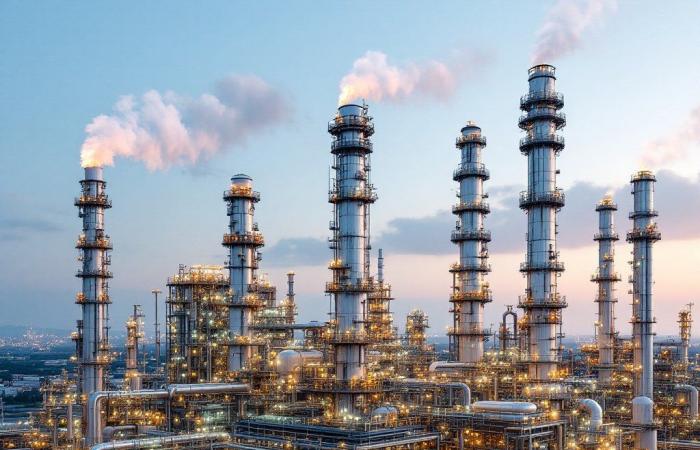The recent announcement of the construction of a new ethane cracker by INEOS in the port of Antwerp has generated great interest in the press. This news is particularly encouraging, as it demonstrates that a private and innovative company firmly believes in the future of the chemical industry in the EU.
This project, called “Project ONE” (1), represents a major investment of more than 3 billion euros and constitutes the most important initiative in the European chemical sector in a generation. In a context where the chemical industry is often criticized, it is fair to recall how much our modern world depends on its products, from plastics to textiles, including medicines and construction materials.
A cracker is a complex industrial plant used to “crack” or break down heavier hydrocarbon molecules into lighter, more useful molecules, including ethylene. The operation of a cracker relies on energy consumption, as the process is endothermic and requires a significant amount of heat, usually generated by the combustion of fossil fuels. The temperature inside the cracker can reach up to around 700-950°C. Additionally, specific material-based catalysts are used to reduce the activation energy required for the reaction, which improves the efficiency of the process.
The strategic importance of ethylene in modern industry
The construction of new crackers in the European Union has stopped for 25 years, mainly due to high costs and strict environmental regulations, but also to endless opposition from NGOs which leads activists to oppose everything project presented by the chemical industry. This pause put the European chemical industry at a competitive disadvantage against American, Chinese and Middle Eastern competitors who continued to invest heavily in new, more efficient facilities.
Traditionally, ethylene was produced from naphtha, a light fraction of crude oil obtained during refining. Naphtha is a complex mixture of hydrocarbons which, when heated to very high temperatures in the presence of steam, decomposes to form ethylene, but also propylene as well as other basic chemicals, but also unwanted coke. This process produces a wider range of byproducts, making it less selective for ethylene.
Ethylene is a chemical compound of central importance to modern industry. It is the largest quantity of organic chemical produced in the world. It serves as a raw material for the production of a wide range of products, including polyethylene (the most commonly used plastic), ethylene oxide (used in antifreeze and detergents), vinyl chloride (for PVC), and ethylbenzene (precursor to styrene and polystyrene, a major insulator for homes). In the form of ethylene glycol, it is used in the production of polyethylene terephthalate to make recyclable water bottles. Global demand for ethylene continues to grow, driven by urbanization and rising standards of living in developing countries.
The shale gas revolution and its impact on petrochemicals
The shale gas revolution in the United States has profoundly transformed the global energy and petrochemical landscape. Massive shale gas extraction has not only provided an abundant source of natural gas — which upended energy geopolitics going so far as to enable the Abraham Accords — but also of ethane, a component of natural gas. . Ethane has proven to be a more efficient feedstock for ethylene production than the traditionally used naphtha. The molecular structure of ethane (C2H6) is already very close to that of ethylene (C2H4), which makes its conversion simpler and more selective, because, unlike production from naphtha, as we have just seen, there is not as much production of by-products and coke. The yield is therefore better and more economical.
Thanks to the production of shale gas in Texas, the new INEOS cracker in Antwerp will be at the cutting edge of technology, integrating several innovations to improve its energy efficiency and environmental record. Among these innovations, we can cite the use of latest generation cracking furnaces and advanced heat recovery systems. These improvements will allow the INEOS cracker to emit less than half the CO2 compared to the cleanest installations in the EU.
The chemical reaction for producing ethylene from ethane can be represented by the following equation:
C2H6 → C2H4 + H₂
This reaction, called dehydrogenation, produces not only ethylene, but also hydrogen as a byproduct. This is a crucial aspect of the process, as hydrogen itself is a very important commodity chemical for the chemical and petrochemical industry.
Technological innovations and hydrogen production
Recognizing the value of this co-produced hydrogen, INEOS plans to build a hydrogen network in the Port of Antwerp petrochemical complex. This network would make it possible to valorize this by-product with high commercial value, by distributing it to other industrial installations which could use it as raw material.
In an effort to appear greener and address EU-imposed decarbonization concerns, INEOS plans to burn some of this hydrogen to fuel the cracking process. This approach is presented as a way to reduce the carbon footprint of the cracker, in a context where the reduction of CO emissions² has become an obsession for many industrial and political actors.
-But it is a double chemical aberration. Hydrogen is a valuable resource with many high value-added applications in the chemical industry and elsewhere its manufacturing also emits CO². Burning it only to produce heat is a waste of expensive resources, for a CO balance² null. To use a phrase I developed in my book “The Hydrogen Utopia,” burning hydrogen would be like burning a Louis Vuitton handbag for warmth — an injudicious use of a high-value product.
Competitiveness and pragmatism: the keys to the European industrial future
In conclusion, the INEOS ethane cracker project in Antwerp perfectly illustrates how the shale gas revolution, which the European Union has refused on its territory on the grounds of ecological untruths, is transforming the global chemical industry. American shale gas producers and the petrochemical companies that benefit from it are making extraordinary profits and have changed the geopolitics of energy thanks to this new source of cheap energy and raw materials. Meanwhile, the European chemical industry is on the verge of collapse…
The INEOS project demonstrates that it is possible to reconcile industrial innovation, energy efficiency and wealth creation. It also underlines the importance of maintaining a positive vision of industrial development, ultimately taking into account economic profitability. If it proves more economical to use ethane produced in Texas rather than naphtha from petroleum distillation, a wise industrialist, capable of lucidly analyzing the geopolitical issues of energy, will naturally know how to direct his strategic choices accordingly. This is how we preserve the competitiveness of European industry in the face of increasingly fierce global competition.
Ultimately, this project reminds us that industrial sustainability is not measured by emissions, but by the ability of a company to remain competitive on the global market through innovation, especially since EU emits less than 7% of global CO₂ emissions.
The chemical industry, far from being a simple polluter, plays a fundamental role in the development of advanced technical solutions. Whether it is advanced technical materials for the automotive industry, high-performance insulation for buildings, or the recycling of plastics, these innovations contribute to both economic efficiency and technological progress. This example is a reminder of the strong synergy that exists between energy policy and the chemical industry, as the success of this innovative cracker project results from innovation in shale oil and gas production in the United States.
Innovation makes it possible to maintain a strong industry, creating jobs and added value, while adapting to market developments and geopolitical constraints. It is this pragmatic approach, rather than an excessive focus on the fallacies of political ecology, that will ensure the survival and prosperity of European industry in the face of increasingly fierce global competition.
(1) https://www.ineos.com/businesses/ineos-olefins-polymers-europe/project-one-groundbreaking/
Also read
“We need more dialogue on the evolution of the human-animal relationship” Bernard Vallat (Interview)
Our environment is a man-nature co-construction, let’s not forget that!
“Elected officials, don’t give in to geobiology” S. Point (Interview)
“Gold should continue to rise” Alessandro Giraudo (Interview)
Author’s book
WordPress:
I like loading…






